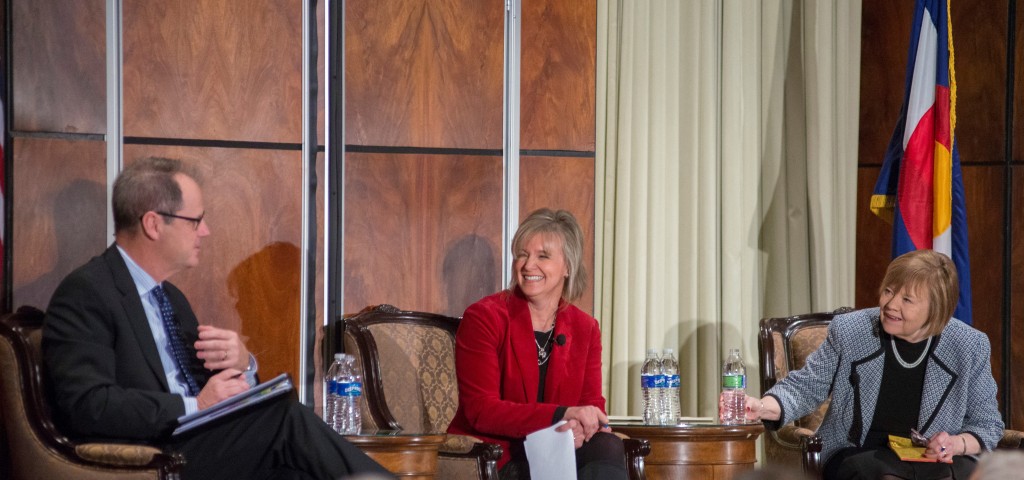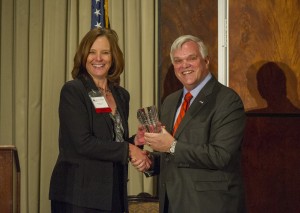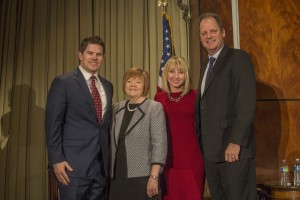In this Capitol Report:
This Capitol Report is brought to you by:
State Policy News
Colorado Business Day Luncheon: Budget Issues, Transportation Funding, Construction-Defect Reform Dominate Legislative Leaders’ Discussion

Senate President Bill Cadman (R-Colorado Springs) , Shaun Boyd, CBS4 political specialist, House Speaker Dickey Lee Hullinghorst (D-Boulder) Photo by Evan Semón
House Speaker Dickey Lee Hullinghorst (D-Boulder) and Senate President Bill Cadman (R-Colorado Springs) yesterday provided an overview of the legislative session and their priorities to about 340 CACI members and guests at the annual Colorado Business Day Luncheon at The Brown Palace Hotel. The discussion was moderated by Shaun Boyd, CBS4 political specialist.
In her opening remarks, Speaker Hullinghorst said that the CACI partnership with the legislature is “very, very important.”
From her perspective, the Speaker said the “number one issue” this session is transportation funding, which is a “huge” problem. The second issue is continuation of the economic recovery, she said, and the third is education and workforce development.
Last year, both Republicans and Democrats in both chambers worked to pass a bi-partisan package of workforce development bills, the Speaker said, and she believes that the legislature “can build” on that accomplishment this year.
The Speaker said the majority House Democrats are focused on regulatory reform, especially as it affects small businesses. She said she wants State Government to “be a help” to small firms and “level the playing field.”
Senator Cadman thanked CACI for inviting him and said he was “glad to be here.” He said that the Speaker had listed many of the top issues for the session this year. He said the two parties “have a strong partnership” on workforce development for those who graduate high school but do not go to a four-year college. Colorado leads the other states in terms of its workforce development policies, he added.
Construction-defect reform will be a top issue, Senator Cadman said, along with expanding rural broadband and passing regulatory reform.
The Senate President and the Speaker both pointed out that many of bills passed by the legislature are bi-partisan in nature.

CACI President Chuck Berry presents a special CACI award of appreciation to Rhonda Sparlin, CACI Tax Council Chair and Board Member. Rhonda has served on the Tax Council for about 25 years. She is a partner at CACI-member RubinBrown LLP. Photo by Evan Semone.
The TABOR limit and whether or not the hospital provider fee (HPF) can—or should–be converted to a state enterprise by statue or ballot initiative, thus freeing up hundreds of millions of dollars for transportation, capital construction and K-12 education, was extensively discussed by the two legislative leaders, who are not in agreement on the issue.
Senator Cadman emphasized that the legislature has exponentially grown the Medicaid budget in recent years while other needs, such as transportation, have suffered from a lack of funding.
With the expansion in Medicaid eligibility under the Federal Affordable Care Act by the Democratically-controlled Colorado legislature several years ago, Senator Cadman said, Colorado spent, or will have spent, an additional $255 million in 2013, $258 million in 20014, $271 million in 2015 and $141 million in 2016 on Medicaid.
Senator Cadman raised the question of Colorado’s priorities: Is it Medicaid expansion above all other needs, such as higher education, K-12 education, transportation or capital construction?
Speaker Hullinghorst said that Colorado faces increased spending on social services because its population grew last year by 100,000 and also to compensate for inflation. “We do have a budget crisis,” she said.
She said the “viable, constitutional way” to solve the budget crisis is to convert the HPF to a state enterprise, thus “freeing up” dollars for other needs.
Concerning a bipartisan agreement on the issue of affordable housing and construction-defect reform, the Speaker said that she and

Daniel O’Connell, CACI, House Speaker Dickey Lee Hullinghorst (D-Boulder), Loren Furman, CACI, Senate President Bill Cadman (R-Colorado Springs) , Photos by Evan Semón
Senate Majority Mark Scheffel (R-Parker) are hold talks at that she has “a lot of hope” for progress. As she has before, the Speaker said that she is not convinced that construction-defect reform “is the most important thing to do to address” the housing shortage and cost. Her concern remains with protecting homeowners who want to take legal action against builders over construction defects.
Senator Cadman pointed out that a number of cities have enacted construction-defect reform ordinances because the legislature has not acted. Concerning the issue, he said the “best deal is one that both sides hate.” He said that the Senate Republicans and the House Democrats are “closer than we have ever been” to reaching an agreement on construction-defect reform and affordable housing.
Concerning Amendment 69, the qualified November ballot initiative that would create a quasi-governmental $25 billion single-payer, health-care system called ColoradoCare, both legislative leaders said they did not expect it to pass. Senator Cadman said he opposed the measure.
The Speaker said her focus on making the Federal Affordable Care Act, as manifested in the state’s health insurance exchange, “as efficient and effective” as possible. Still, ten percent of the state’s population remains uninsured, she added.
News Media Coverage
Below is recent news-media coverage of state and federal political, policy and governmental issues of interest to CACI:
“Colorado Senator Chris Holbert’s big fight to stay small,” by Ed Sealover, The Denver Business Journal, January 22nd.
“Study: Colorado’s state and local tax burden ranks lower than most,” by Jon Murray, The Denver Post, January 20th.
“Opposing GMOs just got harder,” editorial, The Denver Post, January 17th.
“Lawmakers applaud high-ground Hickenlooper speech, settle in for tough work on details,” by Ramsey Scott, The Colorado Statesman, January 15th.
“Hick hits up real estate industry members to sell hospital fee proposal,” by Ramsey Scott, The Colorado Statesman, January 14th.
“State House leaders prepare caucuses for coming clash,” by Ramsey Scott, The Colorado Statesman, January 13th.
“Colorado to open 1st P-TECH schools focused on skilled careers,” The Denver Business Journal, January 12th.
“Workforce-development package still a work in progress,” by Ed Sealover, The Denver Business Journal, January 8th.

